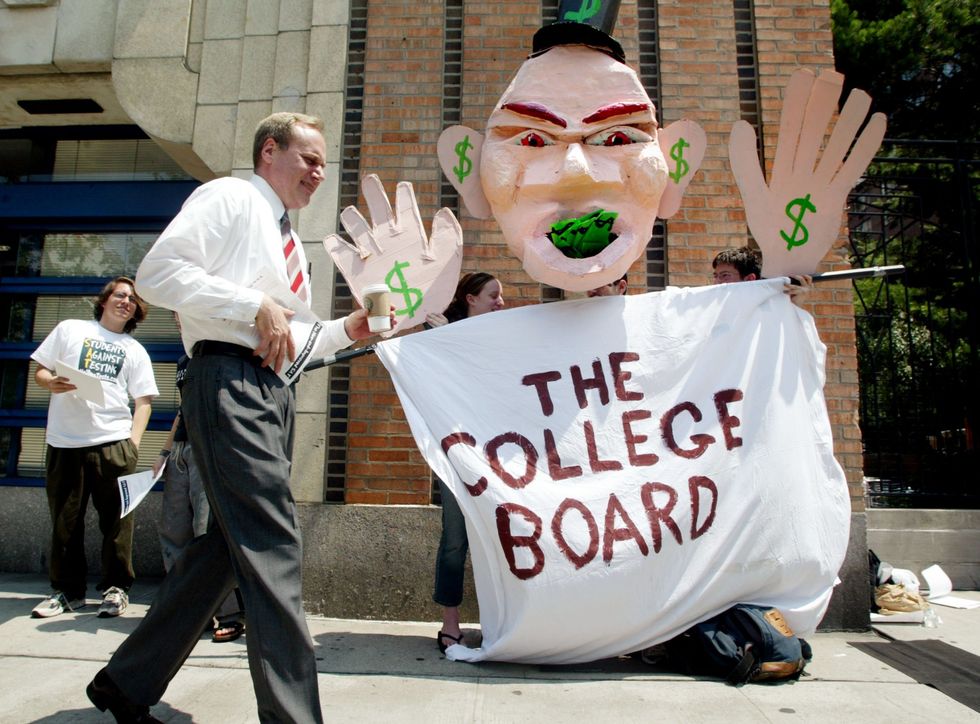I stare at the countdown clock, my anxiety escalating as the timer nears zero. Though this is my fifth Advanced Placement(AP) test, the stress and fear and anxiety never diminish. I am one of the tens of thousands of high schoolers who, during the entire month of May, are frantically buying AP Prep books that claim to boost their AP scores and pulling endless all-nighters to cram a whole year's worth of knowledge into their brain. You would think that the College Board, would just cancel these anxiety-inducing tests much like the International Baccalaureate (IB) program, amidst a worldwide pandemic, however that is not the case; AP students can only dream.
1.07 billion USD. That is how much revenue the College Board generated last year, all while claiming to be a "non-profit". 1.07 billion dollars generated from the stress, anxiety, and tears of high school students. 1.07 billion dollars in revenue all tax-exempt because they define themselves as a "non-profit". To put into scope how much 1.07 billion dollars is worth, here's a list of things you can buy with 1.07 billion dollars and have plenty of money left.
1. The entire Hannah Montana Franchise ($1 billion)
2. The White House ($398 million)
3. A Family Vacation to Space ( $50 million)
I'm a junior currently enrolled in a very competitive public high school. Dodging AP classes is essentially impossible as everyone feels compelled to take them. Your peers pressure you into taking it, your teachers, your parents, and even the bacteria dwelling on the school water fountain is ordering you to do it. Nowadays, AP classes are how students measure their success. One is often shamed for not taking an AP class, looked down upon as dumber, more lethargic, and even less capable. Racking up AP classes is the gateway to having a competitive GPA which provides an edge when applying to colleges. Applicants to selective colleges are advised that they have little chance of being accepted unless they take the most difficult courses in high school. In most cases that means AP. By enrolling in AP classes, there is the possibility for one to earn college credit, however, this comes at a costly price of $94 per AP test and that is IF you pass the AP test. Thus, though AP tests can give you leverage in the college application process, a lot is at stake if one fails.
I am not in the position in which I can complain about Collegeboard and bash them as I'm taking several AP classes this year and it would be hypocritical of me to do so. However, I do have some firm opinions on how Collegeboard's monopoly on education has gone on for far too long.
The Collegeboard dictate what teachers can teach in the classroom, leaving them no room for autonomy. They possess full authority over the entire curriculum of an AP class—developing course outlines for every course. In AP courses, oftentimes the main goal is for a student to get as high on the AP test as possible on a scale of 1-5 with 5 being the highest. With Collegeboard in control, it is no longer about the learning for the student as the overarching goal is to pass the AP test at the end of the course with a high enough score to earn college credit. From my experiences, toward the end of the course as an AP test draws near, my teachers frequently frantically strive to cover the entire course as the amount of material to be taught according to the curriculum is just, simply put, too much. Though I do believe that the College Board presents students with an incredible opportunity to earn college credit, the power they assert over the curriculum of teachers is exorbitant.
Adding on to the ludicrous amount of money you pay Collegeboard to sit to take a test, sending your scores to colleges require additional money. Throughout my high school career, I've spent over two grand in paying for AP exams and will have to pay even more to send these scores to colleges. Though the College Board has connected millions of high school students to success and college opportunities, the application process of applying to colleges is monopolized along with the curriculum in high schools.
If Collegeboard is truly "non-profit" why is the CEO, Trevor Packer, making over 1 million dollars a year? Why are the College Board's executives making $500,000 yearly—more than the salary of most doctors? College Board has been successful in manipulating millions of students and profiting from students' ambitions and desire to succeed. It is time for the College Board to stop pretending to exist for the benefit of students while charging them unnecessarily high prices and come forward and reveal their true purpose: a profit-seeking monopoly with absolute authority over high school curriculums.



















